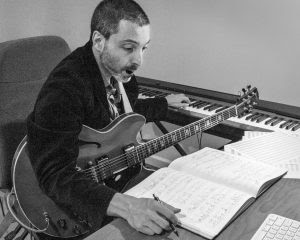 |
| ALL WITHOUT WORDS variations inspired by Loren : Justin Morell and John Daversa and Jazz Orchestra |
A special album was released this past April and it is a thoughtful and moving piece of music that deserves your careful attention. All Without Words variations inspired by Loren is a brilliant representation of the nonverbal sounds that a father, Justin Morell, carefully listened to and recorded of his autistic son Loren. From what I have read, Loren has been unable to verbalize since the age of three and he is presently sixteen. It was one of those continuing attempts that a parent of an autistic child may take to broaden their understanding of how to connect with a child who cannot communicate in traditional verbal ways.
Commissioned by the trumpet master and educator John Daversa
who is the chair of studio and jazz music at University of Miami’s Frost
School, Morell used his recordings of his son as the launching point to create this
dynamic concerto for trumpet and orchestra. Daversa encouraged Morrell to expand his musical
palette on this project and the work incorporates the sounds of a full string
orchestra, a jazz quartet, guest artists and an eight-piece choir to create his
aural panorama as seen from his son’s eyes. Morell is an accomplished jazz guitarist
as well as a formidable orchestrator, composer, and arranger. His previous work
includes his well-received Concerto for Guitar and Jazz Orchestra
featuring Adam Rogers which was released in early 2019. He is currently
teaching as an assistant professor at Lebanon Valley College in Anniston, PA.
The album is a twelve-piece concerto that, independent of
the source of its inspiration, stands on its own as a gorgeous and impressive
piece of work. Morell skillfully expands on the melody that he was able to
harvest from his son’s voicings. He uses the compliant and expressive trumpet lead
voice of Daversa and the magnificently arranged orchestra to musically open a
universe into his son’s experience. A universe that was previously not well understood.
The pieces are representations of an autistic’s world and become more
understandable to the uninitiated by their titles. Compositions include “Loren’s
Theme” the melodic basis of the entire
work, “Searching but Never Finding,” “Two Steps Forward,” “Seeing for the First
Time,” “The Urgency of Every Moment,” “Invisible Things,” “Walking in Our Own
Footsteps- The Circle Game,” ”The Smallest Thing,” “A Day Is Forever-Like Any
Other,” “Three Roads Diverged,” Learning Simply to Be,” and “It’s Enough to Be
Here, Now.”
 |
| Justin Morell ( photo credit unknown) |
This album is a suite that should be listened to in its entirety.
Some pieces may identify with you more than others. These are the impressions
that were evoked by my repeated listening.
The opening piece “Loren’s Theme” is perhaps closest to Morell’s original source melodically and swells with anticipation. “Searching but Never Finding” has a tension that is accentuated by the group’s building ostinato theme under Daversa’s high register searching trumpet. “Two Steps Forward” utilizes an orchestral and rhythmic section cadence that simulates the upward motion of moving ahead in strides. Daversa’s horn leads you in successful steps. “The Urgency of Every Moment” is an aural feast of excitement and anxiousness, brilliantly projected by Daversa’s anxious, shrill sounding horn. “Invisible Things” opens orchestrally in an ethereal way, like you are entering a cloud and are surrounded by celestial voices. “Walking in Our Own Footsteps -The Circle Game” is like a beautiful and joyful waltz. “The Smallest Thing” is like a revelation. The orchestra swells, ebbing and flowing with gorgeous use of horns and strings as Daversa’s subdued trumpet seems to discover unknown things with a cautious curiosity. The orchestra edges him on with patient prodding that lays out a path. The music has moments of majesty and poignancy accentuated by warm and achingly moving string section work. The metronomic opening of “A Day Is Forever-Like Any Other” is paced by drummer David Chiverton’s time locked pace on the rim. The strings hum in synch as Daversa awakens to the repetition of another day like any other. This is familiar territory repeated like a loop of life that never seems to change but awaits to be revisited. “Three Roads Diverged” open joyfully with a repeating string section counterpointed by a probing, darting horn section part. The music is grand and again features Daversa’s lead trumpet navigating the journey laid out by the orchestra.
 |
| John Daversa (photo credit unknown) |
Daversa is an extremely
creative artist who uses his trumpet as an expressive voice that he has employed
throughout with aplomb and sensitivity. Morell’s magical arrangements for orchestra
is quite impressive. He evokes a cornucopia of textures, rhythmic interest and
aural beauty. “Learning Simply to Be” is obviously a task that often takes most
of us a lifetime of conscious practice if ever achievable. One can only imagine how an autistic person,
who may have more than their share of challenges, can master this simple but essential
state of mind. Morell’s music is nonetheless
hopeful and swells with a joyful sense of possibility. The finale is titled “It’s
Enough to Be Here, Now,” a proclamation of what we all should take to heart.
No comments:
Post a Comment